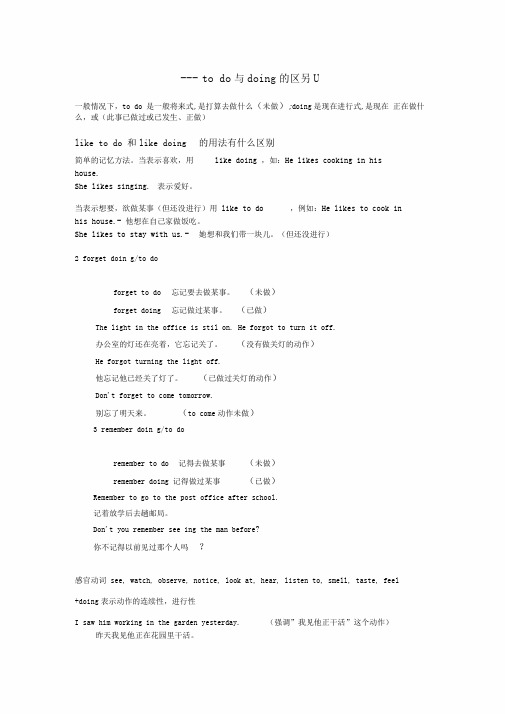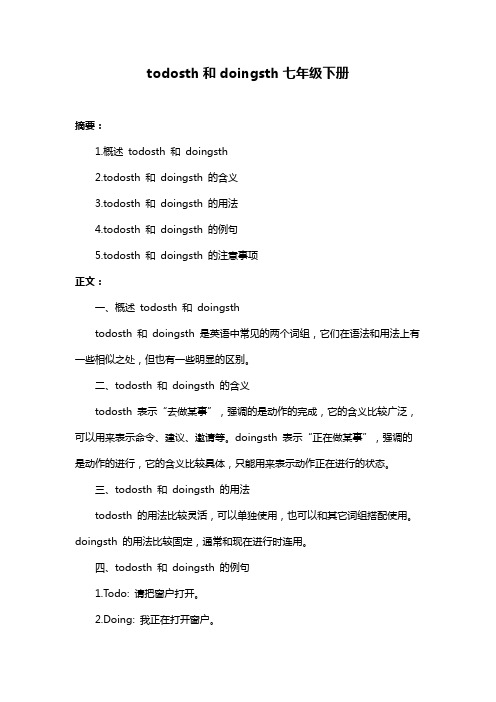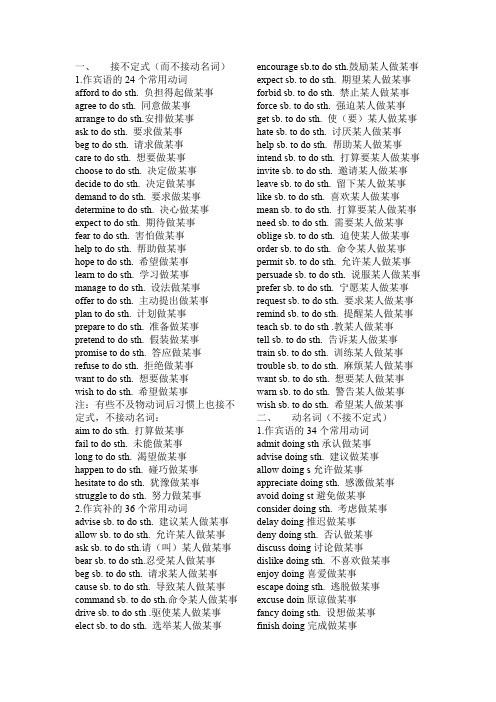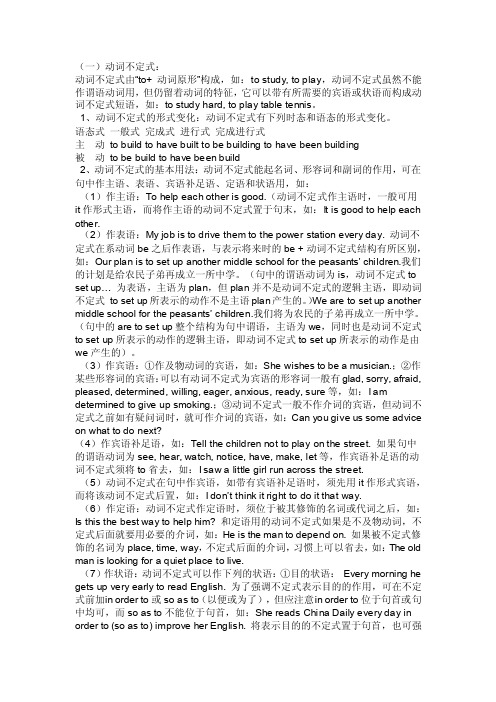2016年中考英语专题复习todo或doingsth区别
todosth和doingsth七年级下册

todosth和doingsth七年级下册"todosth" 和 "doingsth" 是英语中常用的动词时态,常用于描述动作或状态的变化。
这两种时态在七年级下册的英语教学中是非常重要的知识点。
1. "to do sth"(不定式)
用法:表示某个动作尚未发生,但即将发生。
通常用于描述未来的动作或计划。
结构:to + 动词原形 + 其他(例如:to play basketball、to go to the movies)。
例子:I want to go to the park this weekend.(这个周末我想去公园。
)
2. "doing sth"(现在分词)
用法:表示某个动作正在进行中,或者描述某个持续的状态。
结构:动词的 -ing 形式 + 其他(例如:playing basketball、going to the movies)。
例子:They are playing basketball in the gym.(他们正在体育馆里打篮球。
)
在七年级下册的英语教学中,学生需要掌握这两种时态的基本用法和结构,并能够在不同的语境中正确运用。
通过大量的练习和阅读,学生可以逐渐掌握这些时态,并提高自己的英语表达能力。
动词todo与doing的用法区别

动词todo与doing的用法区别————————————————————————————————作者: ————————————————————————————————日期:一、接不定式(而不接动名词)1.作宾语的24个常用动词afford to do sth. 负担得起做某事agree to dosth. 同意做某事arrangeto do sth.安排做某事ask to do sth.要求做某事begto dosth. 请求做某事care to do sth. 想要做某事choose to do sth. 选择做某事decide to do sth.决定做某事demand to dosth.要求做某事determine to dosth.决心做某事expect to do sth. 期待做某事fearto do sth. 害怕做某事help to do sth.帮助做某事hope todosth. 希望做某事learn to do sth. 学习做某事manage todosth. 设法做某事offerto dosth.主动提出做某事plan todosth. 计划做某事prepare to do sth. 准备做某事pretend to do sth.假装做某事promiseto dosth.承诺做某事refuse to dosth.拒绝做某事want to do sth. 想要做某事wish to dosth.希望做某事注:有些不及物动词后习惯上也接不定式,不接动名词:aim todosth.打算做某事failtodosth. 未能做某事long todo sth.渴望做某事happen todo sth. 碰巧做某事hesitate to do sth.犹豫做某事struggle todosth. 努力做某事2.作宾补的36个常用动词advisesb.to do sth.建议某人做某事allowsb.todo sth. 允许某人做某事ask sb. to do sth.请(叫)某人做某事bearsb.to do sth.忍受某人做某事beg sb. to do sth.请求某人做某事cause sb. todo sth.导致某人做某事command sb.to dost h.命令某人做某事drive sb. to do sth .驱使某人做某事electsb. todo st h.选举某人做某事encourage sb.todo sth.鼓励某人做某事expect sb.to do sth. 期望某人做某事forbid sb. to do sth. 禁止某人做某事force sb. to do sth.强迫某人做某事get sb.todo sth.使(要)某人做某事hate sb.to do sth.讨厌某人做某事help sb. to do sth. 帮助某人做某事intendsb. todo st h.打算要某人做某事invite sb. to do sth.邀请某人做某事leave sb.to do sth.留下某人做某事like sb. to dosth. 喜欢某人做某事mean sb. todosth.打算要某人做某事need sb. to do sth.需要某人做某事oblige sb. to dosth. 迫使某人做某事order sb. to dosth. 命令某人做某事permit sb. to do sth. 允许某人做某事persuade sb. to dosth. 说服某人做某事prefersb. to dosth. 宁愿某人做某事request sb. to dosth.要求某人做某事remindsb. todosth. 提醒某人做某事teach sb.to do sth.教某人做某事tell sb.to do sth.告诉某人做某事trainsb. to do sth.训练某人做某事troublesb.to do sth. 麻烦某人做某事want sb. to do sth. 想要某人做某事warn sb. to do sth.警告某人做某事wishsb. to do sth. 希望某人做某事二、动名词(不接不定式)1.作宾语的34个常用动词admitdoingsth承认做某事advise doingsth.建议做某事allow doing sth允许做某事appreciate doingsth. 感激做某事avoid doing sth避免做某事considerdoing sth. 考虑做某事delay doing sth推迟做某事deny doing sth.否认做某事discuss doingsth讨论做某事dislike doing sth. 不喜欢做某事enjoy doingsth喜爱做某事escape doing sth.逃脱做某事excuse doing sth原谅做某事fancy doingsth. 设想做某事finishdoing sth完成做某事forbiddoing sth.禁止做某事forgive doing sth原谅做某事giveupdoingsth.放弃做某事imaginedoing sth想象做某事keepdoing sth.保持做某事mention doing sth提及做某事mind doingsth. 介意做某事miss doing sth.错过某事pardon doing sth. 原谅做某事permit doing sth.允许做某事practice doing sth.练习做某事preventdoing sth阻止做某事prohibit doing sth.禁止做某事putoff doing sth推迟做某事reportdoing sth. 报告做某事riskdoing sth冒险做某事stop doingsth.停止做某事suggest doing sth建议做某事understand doing sth.理解做某2.作宾补的20个常用动词bring sb.doing sth.引起某人做某事catch sb.doingsth. 碰上某人做某事discoversb. doing sth发现某人做某事feel sb.doing sth. 感觉某人做某事find sb.doing sth.碰上某人做某事get sb. doingsth.使某人做某事have sb.doing sth使某人做某事hear sb. doing sth. 听见某人做某事keepsb. doing sth使某人不停地做某事listen to sb. doing sth.听某人做某事lookatsb. doing sth看着某人做某事notice sb. doing sth注意到某人做某事observe sb. doing sth观察某人做某事prevent sb. doing sth.阻止某人做某事seesb.doingsth看见某人做某事send sb.doingsth使某人(突然)做某事set sb. doing sth使(引起)某人做某事startsb.doing sth.使某人开始做某事stop sb.doing sth阻止某人做某事watch sb. doingsth. 看到某人做某事三.接动词原形作宾补的11个常用动词feel sb. do sth.感觉某人做某事havesb.do sth. 使某人做某事hear sb.do sth. 听见某人做某事let sb.do sth.让某人做某事listen tosb.do sth.听着某人做某事look at sb.do sth. 看着某人做某事makesb. do sth.使某人做某事notice sb.dosth.注意某人做某事observesb. do sth. 观察某人做某事seesb. do sth. 看见某人做某事注意两组区别:1.todo与doing 的区别(1)remember todosth. 记住要做某事(未做)remember doing sth. 记住曾做过某事(已做)(2)forgetto do sth.忘记要做某事(未做)forget doing sth. 忘记曾做过某事(已做)(3)regret to do sth. 后悔(遗憾)要做某事regret doing sth. 后悔(遗憾)曾做过某事(4)tryto do sth.设法要做某事try doing sth. 做某事试试看有何效果(5) mean to dosth.打算做某事meandoingsth. 意味着做某事(6) can’t helptodo sth. 不能帮助做某事can’t help doing sth.禁不住做某事(7)go onto do sth. 做完某事后接着做另一事go on doing sth.继续做一直在做的事(8)stop to do sth. 停下来去做某事stopdoing sth停止正在做的事2.感官动词+ doing/do 感官动词see, watch, observ e,notice, look at, hear,listen to,smell, taste, f eel+do 表示动作的完整性,真实性;+doing 表示动作的连续性,进行性。
todo与doing的区别

--- to do与doing的区另U一般情况下,to do 是一般将来式,是打算去做什么(未做);doing是现在进行式,是现在正在做什么,或(此事已做过或已发生、正做)like to do 和like doing 的用法有什么区别简单的记忆方法。
当表示喜欢,用like doing ,如:He likes cooking in hishouse.She likes singing. 表示爱好。
当表示想要,欲做某事(但还没进行)用like to do ,例如:He likes to cook inhis house.- 他想在自己家做饭吃。
She likes to stay with us.- 她想和我们带一块儿。
(但还没进行)2 forget doin g/to doforget to do 忘记要去做某事。
(未做)forget doing 忘记做过某事。
(已做)The light in the office is stil on. He forgot to turn it off.办公室的灯还在亮着,它忘记关了。
(没有做关灯的动作)He forgot turning the light off.他忘记他已经关了灯了。
(已做过关灯的动作)Don't forget to come tomorrow.别忘了明天来。
(to come动作未做)3 remember doin g/to doremember to do 记得去做某事(未做)remember doing 记得做过某事(已做)Remember to go to the post office after school.记着放学后去趟邮局。
Don't you remember see ing the man before?你不记得以前见过那个人吗?感官动词 see, watch, observe, notice, look at, hear, listen to, smell, taste, feel+doing表示动作的连续性,进行性I saw him working in the garden yesterday. (强调”我见他正干活”这个动作)昨天我见他正在花园里干活。
todosth和doingsth七年级下册

todosth和doingsth七年级下册摘要:1.概述todosth 和doingsth2.todosth 和doingsth 的含义3.todosth 和doingsth 的用法4.todosth 和doingsth 的例句5.todosth 和doingsth 的注意事项正文:一、概述todosth 和doingsthtodosth 和doingsth 是英语中常见的两个词组,它们在语法和用法上有一些相似之处,但也有一些明显的区别。
二、todosth 和doingsth 的含义todosth 表示“去做某事”,强调的是动作的完成,它的含义比较广泛,可以用来表示命令、建议、邀请等。
doingsth 表示“正在做某事”,强调的是动作的进行,它的含义比较具体,只能用来表示动作正在进行的状态。
三、todosth 和doingsth 的用法todosth 的用法比较灵活,可以单独使用,也可以和其它词组搭配使用。
doingsth 的用法比较固定,通常和现在进行时连用。
四、todosth 和doingsth 的例句1.Todo: 请把窗户打开。
2.Doing: 我正在打开窗户。
五、todosth 和doingsth 的注意事项在使用todosth 和doingsth 时,需要注意以下几点:1.todosth 和doingsth 的主语必须一致。
2.todosth 和doingsth 的时态必须一致。
3.todosth 和doingsth 的语态必须一致。
总的来说,todosth 和doingsth 虽然都是表示动作的词组,但它们的用法和含义有所不同。
2016年中考英语专题复习todo或doingsth区别

接 to do 仍是 doing sth?初中英语中有很多动词后既能够动词不定式,即 to do something ,又可接动名词,即 doingsomething,如:start, begin, like, hate, love, remember, forget, try, stop, learn, go on, need 等,其含义有的邻近,有的意义迥然。
从意义上讲,能够将这些动词大概分为三类:一、意义不发生变化。
如: start, begin 等,所以 start/ begin to do something/ doing something 均可表示开始做某事。
如:When did you begin/ start to learn/ learning English?你什么时候开始学习英语的?I often start/ begin to brush brushing my teeth at 6.30.我常常在 6.30 时开始刷牙。
二、意义稍有变化。
在有些词,如:like, hate 和love 后接动名词时表示一般的、常常性的行为;若接动词不定式则表示某一特定场合的详细的行为。
如:I like swimming but I don’tlike to swim with you today.我喜爱游泳但我不喜爱今日与你一同游泳。
The boy hates asking someone for help.这个男孩厌烦叫人帮忙。
(这是他的一向习惯喜好)The boy hates to climb up the tree like that.这个男孩厌烦像那样爬树。
(这是一次详细的行为)三、意义发生根本变化1.若动名词的动作发生在该动词以前,后 doing something ;若动作发生在该动词以后,则用 todo something ,如: remember, forget, regret 等。
动词todo与doing的用法区别

一、接不定式(而不接动名词)1.作宾语的24个常用动词afford to do sth. 负担得起做某事agree to do sth. 同意做某事arrange to do sth.安排做某事ask to do sth. 要求做某事beg to do sth. 请求做某事care to do sth. 想要做某事choose to do sth. 选择做某事decide to do sth. 决定做某事、demand to do sth. 要求做某事determine to do sth. 决心做某事expect to do sth. 期待做某事fear to do sth. 害怕做某事help to do sth. 帮助做某事hope to do sth. 希望做某事learn to do sth. 学习做某事manage to do sth. 设法做某事offer to do sth. 主动提出做某事plan to do sth. 计划做某事《prepare to do sth. 准备做某事pretend to do sth. 假装做某事promise to do sth. 承诺做某事refuse to do sth. 拒绝做某事want to do sth. 想要做某事wish to do sth. 希望做某事注:有些不及物动词后习惯上也接不定式,不接动名词:aim to do sth. 打算做某事fail to do sth. 未能做某事long to do sth. 渴望做某事、happen to do sth. 碰巧做某事hesitate to do sth. 犹豫做某事struggle to do sth. 努力做某事2.作宾补的36个常用动词advise sb. to do sth. 建议某人做某事allow sb. to do sth. 允许某人做某事ask sb. to do sth.请(叫)某人做某事bear sb. to do sth.忍受某人做某事beg sb. to do sth. 请求某人做某事cause sb. to do sth. 导致某人做某事,command sb. to do sth.命令某人做某事drive sb. to do sth .驱使某人做某事elect sb. to do sth. 选举某人做某事encourage sb. to do sth.鼓励某人做某事expect sb. to do sth. 期望某人做某事forbid sb. to do sth. 禁止某人做某事force sb. to do sth. 强迫某人做某事get sb. to do sth. 使(要)某人做某事hate sb. to do sth. 讨厌某人做某事help sb. to do sth. 帮助某人做某事!intend sb. to do sth. 打算要某人做某事invite sb. to do sth. 邀请某人做某事leave sb. to do sth. 留下某人做某事like sb. to do sth. 喜欢某人做某事mean sb. to do sth. 打算要某人做某事need sb. to do sth. 需要某人做某事oblige sb. to do sth. 迫使某人做某事order sb. to do sth. 命令某人做某事permit sb. to do sth. 允许某人做某事persuade sb. to do sth. 说服某人做某事[prefer sb. to do sth. 宁愿某人做某事request sb. to do sth. 要求某人做某事remind sb. to do sth. 提醒某人做某事teach sb. to do sth .教某人做某事tell sb. to do sth. 告诉某人做某事train sb. to do sth. 训练某人做某事trouble sb. to do sth. 麻烦某人做某事want sb. to do sth. 想要某人做某事warn sb. to do sth. 警告某人做某事wish sb. to do sth. 希望某人做某事'二、动名词(不接不定式)1.作宾语的34个常用动词admit doing sth承认做某事advise doing sth. 建议做某事allow doing sth允许做某事appreciate doing sth. 感激做某事avoid doing sth避免做某事consider doing sth. 考虑做某事delay doing sth推迟做某事deny doing sth. 否认做某事'discuss doing sth讨论做某事dislike doing sth. 不喜欢做某事enjoy doing sth喜爱做某事escape doing sth. 逃脱做某事excuse doing sth原谅做某事fancy doing sth. 设想做某事finish doing sth完成做某事forbid doing sth. 禁止做某事forgive doing sth原谅做某事give up doing sth. 放弃做某事?imagine doing sth想象做某事keep doing sth. 保持做某事mention doing sth提及做某事mind doing sth. 介意做某事miss doing sth. 错过某事pardon doing sth. 原谅做某事permit doing sth. 允许做某事practice doing sth. 练习做某事prevent doing sth阻止做某事prohibit doing sth. 禁止做某事|put off doing sth推迟做某事report doing sth. 报告做某事risk doing sth冒险做某事stop doing sth. 停止做某事suggest doing sth建议做某事understand doing sth. 理解做某2.作宾补的20个常用动词bring sb. doing sth.引起某人做某事catch sb. doing sth. 碰上某人做某事discover sb. doing sth发现某人做某事)feel sb. doing sth. 感觉某人做某事find sb. doing sth. 碰上某人做某事get sb. doing sth. 使某人做某事have sb. doing sth使某人做某事hear sb. doing sth. 听见某人做某事keep sb. doing sth使某人不停地做某事listen to sb. doing sth. 听某人做某事look at sb. doing sth看着某人做某事notice sb. doing sth注意到某人做某事observe sb. doing sth观察某人做某事)prevent sb. doing sth. 阻止某人做某事see sb. doing sth看见某人做某事send sb. doing sth使某人(突然)做某事set sb. doing sth使(引起)某人做某事start sb. doing sth. 使某人开始做某事stop sb. doing sth阻止某人做某事watch sb. doing sth. 看到某人做某事三.接动词原形作宾补的11个常用动词feel sb. do sth. 感觉某人做某事have sb. do sth. 使某人做某事;hear sb. do sth. 听见某人做某事let sb. do sth.让某人做某事listen to sb. do sth. 听着某人做某事look at sb. do sth. 看着某人做某事make sb. do sth. 使某人做某事notice sb. do sth. 注意某人做某事observe sb. do sth. 观察某人做某事see sb. do sth. 看见某人做某事注意两组区别:·1. to do 与doing 的区别(1) remember to do sth. 记住要做某事(未做)remember doing sth. 记住曾做过某事(已做)(2) forget to do sth. 忘记要做某事(未做)forget doing sth. 忘记曾做过某事(已做)(3) regret to do sth. 后悔(遗憾)要做某事regret doing sth. 后悔(遗憾)曾做过某事(4) try to do sth. 设法要做某事try doing sth. 做某事试试看有何效果(5) mean to do sth. 打算做某事mean doing sth. 意味着做某事(6) can’t help to do sth. 不能帮助做某事can’t help doing sth. 禁不住做某事(7) go on to do sth. 做完某事后接着做另一事go on doing sth. 继续做一直在做的事(8)stop to do sth. 停下来去做某事stop doing sth 停止正在做的事2. 感官动词+ doing/ do感官动词see, watch, observe, notice, look at, hear, listen to, smell, taste, feel+ do表示动作的完整性,真实性;+doing 表示动作的连续性,进行性。
动词to-do-与doing-的用法区别

一、接不定式(而不接动名词)1.作宾语的24个常用动词afford to do sth. 负担得起做某事agree to do sth. 同意做某事arrange to do sth.安排做某事ask to do sth. 要求做某事beg to do sth. 请求做某事care to do sth. 想要做某事choose to do sth. 决定做某事decide to do sth. 决定做某事demand to do sth. 要求做某事determine to do sth. 决心做某事expect to do sth. 期待做某事fear to do sth. 害怕做某事help to do sth. 帮助做某事hope to do sth. 希望做某事learn to do sth. 学习做某事manage to do sth. 设法做某事offer to do sth. 主动提出做某事plan to do sth. 计划做某事prepare to do sth. 准备做某事pretend to do sth. 假装做某事promise to do sth. 答应做某事refuse to do sth. 拒绝做某事want to do sth. 想要做某事wish to do sth. 希望做某事注:有些不及物动词后习惯上也接不定式,不接动名词:aim to do sth. 打算做某事fail to do sth. 未能做某事long to do sth. 渴望做某事happen to do sth. 碰巧做某事hesitate to do sth. 犹豫做某事struggle to do sth. 努力做某事2.作宾补的36个常用动词advise sb. to do sth. 建议某人做某事allow sb. to do sth. 允许某人做某事ask sb. to do sth.请(叫)某人做某事bear sb. to do sth.忍受某人做某事beg sb. to do sth. 请求某人做某事cause sb. to do sth. 导致某人做某事command sb. to do sth.命令某人做某事drive sb. to do sth .驱使某人做某事elect sb. to do sth. 选举某人做某事encourage sb.to do sth.鼓励某人做某事expect sb. to do sth. 期望某人做某事forbid sb. to do sth. 禁止某人做某事force sb. to do sth. 强迫某人做某事get sb. to do sth. 使(要)某人做某事hate sb. to do sth. 讨厌某人做某事help sb. to do sth. 帮助某人做某事intend sb. to do sth. 打算要某人做某事invite sb. to do sth. 邀请某人做某事leave sb. to do sth. 留下某人做某事like sb. to do sth. 喜欢某人做某事mean sb. to do sth. 打算要某人做某事need sb. to do sth. 需要某人做某事oblige sb. to do sth. 迫使某人做某事order sb. to do sth. 命令某人做某事permit sb. to do sth. 允许某人做某事persuade sb. to do sth. 说服某人做某事prefer sb. to do sth. 宁愿某人做某事request sb. to do sth. 要求某人做某事remind sb. to do sth. 提醒某人做某事teach sb. to do sth .教某人做某事tell sb. to do sth. 告诉某人做某事train sb. to do sth. 训练某人做某事trouble sb. to do sth. 麻烦某人做某事want sb. to do sth. 想要某人做某事warn sb. to do sth. 警告某人做某事wish sb. to do sth. 希望某人做某事二、动名词(不接不定式)1.作宾语的34个常用动词admit doing sth承认做某事advise doing sth. 建议做某事allow doing s允许做某事appreciate doing sth. 感激做某事avoid doing st避免做某事consider doing sth. 考虑做某事delay doing推迟做某事deny doing sth. 否认做某事discuss doing讨论做某事dislike doing sth. 不喜欢做某事enjoy doing喜爱做某事escape doing sth. 逃脱做某事excuse doin原谅做某事fancy doing sth. 设想做某事finish doing完成做某事给大家推荐一个英语微信群-Empty Your Cup英语微信群是目前学习英语最有效的方法,群里都是说英语,没有半个中文,而且规则非常严格,是一个超级不错的英语学习环境,群里有好多英语超好的超牛逼的人,还有鬼佬和外国美眉。
todo与doing区别

(一)动词不定式:动词不定式由“to+ 动词原形”构成,如:to study, to play,动词不定式虽然不能作谓语动词用,但仍留着动词的特征,它可以带有所需要的宾语或状语而构成动词不定式短语,如:to study ha rd, to play tabl e tennis。
1、动词不定式的形式变化:动词不定式有下列时态和语态的形式变化。
语态式一般式完成式进行式完成进行式主动to buildto have built to be building tohave been buildi ng被动to be b uild to have bee n build2、动词不定式的基本用法:动词不定式能起名词、形容词和副词的作用,可在句中作主语、表语、宾语补足语、定语和状语用,如:(1)作主语:T o help each othe r is good.(动词不定式作主语时,一般可用it作形式主语,而将作主语的动词不定式置于句末,如:It is good to help each other.(2)作表语:My job is to drive the m to the power s tation every day. 动词不定式在系动词be之后作表语,与表示将来时的be + 动词不定式结构有所区别,如:Our plan is to setup another middl e school for the peasants’ child ren.我们的计划是给农民子弟再成立一所中学。
(句中的谓语动词为is,动词不定式to set u p… 为表语,主语为plan,但plan并不是动词不定式的逻辑主语,即动词不定式to setup所表示的动作不是主语plan产生的。
)We are to s et up another mi ddle school forthe peasants’ ch ildren.我们将为农民的子弟再成立一所中学。
- 1、下载文档前请自行甄别文档内容的完整性,平台不提供额外的编辑、内容补充、找答案等附加服务。
- 2、"仅部分预览"的文档,不可在线预览部分如存在完整性等问题,可反馈申请退款(可完整预览的文档不适用该条件!)。
- 3、如文档侵犯您的权益,请联系客服反馈,我们会尽快为您处理(人工客服工作时间:9:00-18:30)。
接 to do 还是doing sth?
初中英语中有许多动词后既可以动词不定式,即to do something ,又可接动名词,即doing something ,如:start, begin, like, hate, love, remember, forget, try, stop, learn, go on, need 等,其含义有的相近,有的意义迥然。
从意义上讲,可以将这些动词大致分为三类:
一、意义不发生变化。
如:start, begin 等,因此start/ begin to do something/ doing something 均可表示开始做某事。
如:
When did you begin/ start to learn/ learning English?
你什么时候开始学习英语的?
I often start/ begin to brush brushing my teeth at 6.30.
我经常在6.30时开始刷牙。
二、意义稍有变化。
在有些词,如:like, hate 和love 后接动名词时表示一般的、经常性的行为;若接动词不定式则表示某一特定场合的具体的行为。
如:
I like swimming but I don ’t like to swim with you today.
我喜欢游泳但我不喜欢今天与你一起游泳。
The boy hates asking someone for help.
这个男孩讨厌叫人帮忙。
(这是他的一贯习惯爱好)
The boy hates to climb up the tree like that.
这个男孩讨厌像那样爬树。
(这是一次具体的行为)
三、意义发生根本变化
1.若动名词的动作发生在该动词之前,后doing something ;若动作发生在该动词之后,则用to do something ,如:remember, forget, regret 等。
I remember meeting you in Shanghai three years ago.
我记得三年前在上海见过你。
{
I will never forget to meet you in Shanghai three days later.
我永远不会忘记三天后去上海见你。
2.含义根本不同
Would you please stop to help me mend my broken bike?
请你停下来帮我修一下我的坏自行车,好吗?
{
We all should try to answer the questions all by ourselves.
我们都应该尽力独立回答这些问题。
{
Let ’s go on to pick apples after finishing doing our homework.
做完家庭作业后,让我们继续去摘苹果。
I ’I have learnt driving a car.
我已经学会开汽车了。
{ We often hear someone sing Beijing Opera in the next room every afternoon. 每天下午我们经常听见有人在隔壁房间里唱京剧。
练习:
( )1.Yesterday we learned Lesson 1. Today let ’s go on Lesson 2.
A. learn
B. learning
C. learned
D. to learn
( )2.Though all of us are very tired, none of us stop a rest.
A. have
B. having
C. had
D. to have
( )3.Don ’t forget some food and drinks to school tomorrow.
A. bringing
B. to bring
C. taking
D. to take
( )4.It ’s very important for us teenagers to learn for their turn.
A. wait
B. waiting
C. to wait
D. waitting
( )5.Mary likes , but she hates in winter.
A. swim, swim
B. swimming, swimming
C. swimming, to swim
D. to swim, swimming
6.当你在街上时,记住要小心红绿灯。
7.你应该试着五分钟内回答所有的问题。
8.当我到达教室时,他们已经开始读英语了。
9.不要讲话。
汽车来了。
10.你能发现他们正在抄别人的作业吗?
Key:
1-5DDBBC
6.Remember to look out for the traffic lights when you are in the street.
7.You should/ ought to try answering all the questions in five minutes.
8.They had begun to read/ reading English when I got to the classroom.
9.Stop talking. Here comes the bus.
10.Can you find them copying others’ homework now?。
